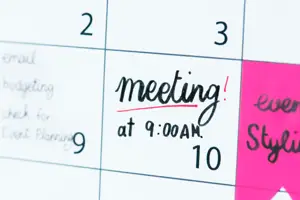How to conduct an effective meeting
Welcome to Aniday's in-depth guide on "Mastering Effective Meetings." In this article, we'll explore how to run an effective meeting and how it can positively impact your business. Aniday covers from the essential knowledge to the useful tips anyone can apply to their own business setting. Let's discover this exciting topic and its potentiality.

What is an effective meeting?
Meetings are crucial to keep your team working synchronously and your business plan running smoothly. Whether you need to exchange information, gather new initiatives, or make decisions, there are various positive effects of having employee meetings. This raises the question of what makes a meeting effective.
An effective meeting is a gathering where the right people come together to discuss a specific topic. It is expected to lead to a clear result, like making a decision, forming a plan, generating a list of ideas, or ensuring everyone understands the incoming task. The key is that the meeting serves a purpose and achieves something meaningful.
Key characteristics of an effective meeting
-
Clear Purpose: Effective meetings have a clear and specific reason for happening. Everyone should understand why we're meeting and what we hope to achieve.
-
A Detailed Plan: Prior to the meeting, we present an agenda outlining what we'll discuss and the sequence in which we'll discuss it. This keeps the meeting organized.
-
Proactive Participation: Everyone in the meeting actively participates in the conversation, gives their ideas, and contributes to our success. We urge people to express themselves and share their opinions.
-
Making Choices: Effective meetings aim to make decisions, create plans, or figure out what steps to take next. We want the meeting to lead to real results.
-
Follow-Up and Responsibility: During the meeting, we set clear actions, assign tasks to specific people, and decide when things need to be done. After the meeting, we make sure people do what they agreed to do, and everyone is responsible for their part.
Practical guide for conducting an effective meeting

Set a clear objective
When starting the meeting, make sure you have a defined purpose and objective for hosting the meeting. Take into consideration what you want the meeting to lead to. For example, you may want to gather information and input from teammates or stakeholders or aim to reach a decision on a business topic.
Consider your participants
Take some time to define the people you want and need to participate in the meeting. If you need to have a discussion with a specific employee, make sure they're on the list of participants. It's also critical to involve people who can offer valuable input depending on the agenda item.
Manage starting and ending time
Make sure you share the meeting agenda with your stakeholders beforehand to ensure everyone is aware of the start time. Set rules and make sure the participants know the time allocation of your meeting. This is helpful to keep everyone focused and arrive at the end of the meeting promptly and effectively.

Follow your agenda
Now that you’ve made a clear agenda, make sure you follow it throughout the meeting. It's important to cover everything you planned and stick with the time allocation you made for each item on the list. It's always useful to display your agenda for the participants to see and follow during the meeting.
Follow-up
After the meeting, it's necessary to send everyone an email recapping the discussion and the accomplishment of the meeting. In this email, you should also include the assigned tasks and the upcoming deadlines so that everyone knows what are the next steps and their responsibilities.
How an effective meeting can benefit your business
Now that you understand the critical steps to conduct a meeting, however, it takes practice and skills to master in conducting effective meetings consistently. The better you are at this, there are more benefits you will witness within your business.
Better engagement and cooperation
A meeting when being led the right way allows all the attendees to participate and provide input. An effective meeting host knows how to engage each individual by asking questions and lead the conversation so that everyone knows that their ideas and perspective are valued and taken into consideration. Meetings like these can even lead to brainstorming sessions that bring up creative initiatives and solutions.

Increased sense of responsibility
A good meeting facilitator knows how to create an environment in which the attendee feels encouraged to contribute. This leads to the fact that everyone is willing to take on new assignments since it was made clear that every task is crucial to reach the goal of the bigger project. Volunteering for a new task in a meeting usually has more weight than other situations, employees would feel more responsible to the team and are more motivated to accomplish their part of the project.
A shared sense of objective
The importance of setting clear meeting objectives and providing an agenda has been mentioned several times in the previous part. A skilled meeting host knows how to use the agenda to gear the discussion towards the team's goals direction.
Sharing the objectives and agenda with the participants allows everyone to have a shared sense of objective, meaning that everyone understands the importance of the meeting and why they are involved. This gives them the motivation during the meeting to be proactive as well as when they work on their individual task afterwards.
Opportunities for personal development
Last but not least, an effective meeting in many ways creates opportunities for each individual to develop important skills. The effective meeting facilitator can communicate effectively and motivate the team to be responsible for their commitments. The attendees in turn will have the chance to witness and adopt the skills and knowledge modeled by the host.
An effective meeting will also open new challenges for the attendees in which they can learn and enhance their personal skills. It's beneficial when employees can join a group that allows them to develop the skills on the tasks that they’re interested in even if they have limited knowledge.

Conclusion
It's undeniable how effective meetings can positively impact your organization’s performance. The concept does sound simple but mastering this indeed takes significant effort and practice.
To take your organization's development one step ahead, make sure you follow Aniday's guide on how to run an effective meeting by setting clear objectives, creating a plan for the right participants, encouraging engagement, managing the expected results as well as following up accordingly.
Aniday's HR Services
Headhunting Service
Find and recruit quality candidates in just 1 week! Supported by 40,000 experienced headhunters in IT, Finance, Marketing… capable of recruiting in any region.
Headhunting Service ➔Employer of Record (EOR) Service
On behalf of your business, we recruit employees and handle payroll without the need to establish a company in markets such as Vietnam, Singapore, Malaysia, India, Indonesia…
Employer of Record (EOR) Service ➔